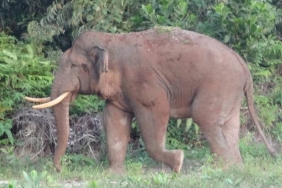NEARLY 30 PERCENT OF THE WORLD'S ILLEGAL WILDLIFE TRADE OCCURS IN PROTECTED AREAS
Gland, Switzerland - A new WWF report launched today urges immediate additional measures to halt the alarming trend of illegal trade in CITES-listed international species - which is occurring in some of the world's most ecologically important places including World Heritage Sites.
Known for their iconic beauty, geology, ecology and biodiversity, natural World Heritage sites around the world support large populations of rare plant and animal species, including nearly one-third of the world's remaining 3,890 wild tigers and 40 percent of all African elephants, and serve as last refuges for endangered species such as the Javan rhinoceros in Indonesia and vaquitas, the world's smallest dolphins, endemic to the Gulf of California, Mexico.
However, despite their recognized and protected status, illegal hunting, logging and illegal fishing are rife in nearly 30 percent of both natural and man-made World Heritage sites, bringing endangered species to the brink of extinction and putting the livelihoods and well-being of the communities that depend on them at risk.
"Natural World Heritage Sites are among the most recognized natural sites for their universal value. Yet many are threatened by destructive industrial activities and our new report shows that unique wild animals and plants are also affected by over-exploitation and illegal trade. If they are not effectively protected, we will lose them forever. Governments must redouble their efforts and tackle the entire wildlife trade chain, before it's too late." said Marco Lambertini, Director of WWF International. "We urgently need more collaboration and integration between CITES, the World Heritage Sites Convention and national authorities for targeted coordination, as well as a comprehensive response to stop wildlife trafficking - from source countries to wildlife capture, transportation through processing destinations, finally to sales in consumer markets."
Illegal capture of wildlife within World Heritage sites undermines vital social and economic benefits. More than 90 percent of natural World Heritage sites support recreation and tourism and provide employment. Many of these benefits depend on the presence of CITES-listed species. Illegal logging also alters natural ecosystems. Around five percent of the Sumatran Tiger population died in 2016 alone and if current levels of poaching and trade continue to increase, tigers could disappear in Sumatra and lead to reduced incentives to protect forests which would then result in further large-scale deforestation for oil palm plantations.
"This report provides a range of options to further improve coordination between CITES and the World Heritage Sites Convention, focused around World Heritage sites." said John Scanlon, Secretary General of CITES. "It is critical that CITES is fully implemented and that irreplaceable sites are fully protected. When we do that, we will benefit our heritage and wildlife, provide security to many people and places, and support national economies and rural communities that depend on these sites for their livelihoods."
"The illegal trade in wildlife robs World Heritage itself of its riches, threatens local communities and hampers global efforts to reduce poverty," said Inger Andersen, Director General of the International Union for Conservation of Nature (IUCN). "This report is an alarm of how far these types of organized crime can reach, extending even into the security of World Heritage sites. This is a global challenge that can only be addressed through comprehensive action, internationally."
The report emphasizes that enhanced protection and monitoring within World Heritage sites must be accompanied by greater action to curb demand for wildlife and other illegal wildlife products through education, law enforcement and justice. "The governing bodies of CITES and the World Heritage Convention recognize the need to continuously improve the interaction between the two conventions, and to stop illegal trade in World Heritage sites, all stakeholders must urgently unite and take the necessary actions to prevent irreversible damage to the world's most iconic places and species," Lambertini said.
Last year, WWF launched a global campaign, "Together saving our world heritage", working with governments and businesses to safeguard World Heritage sites for current and future generations by strengthening implementation of the World Heritage Convention and encouraging businesses to adhere to the highest standards of responsible business conduct in or around site areas. A WWF report found nearly half of all natural World Heritage sites are under threat from harmful industrial activities such as mining, oil and gas drilling, and large-scale infrastructure development, with millions of people affected.
---DONE ---





